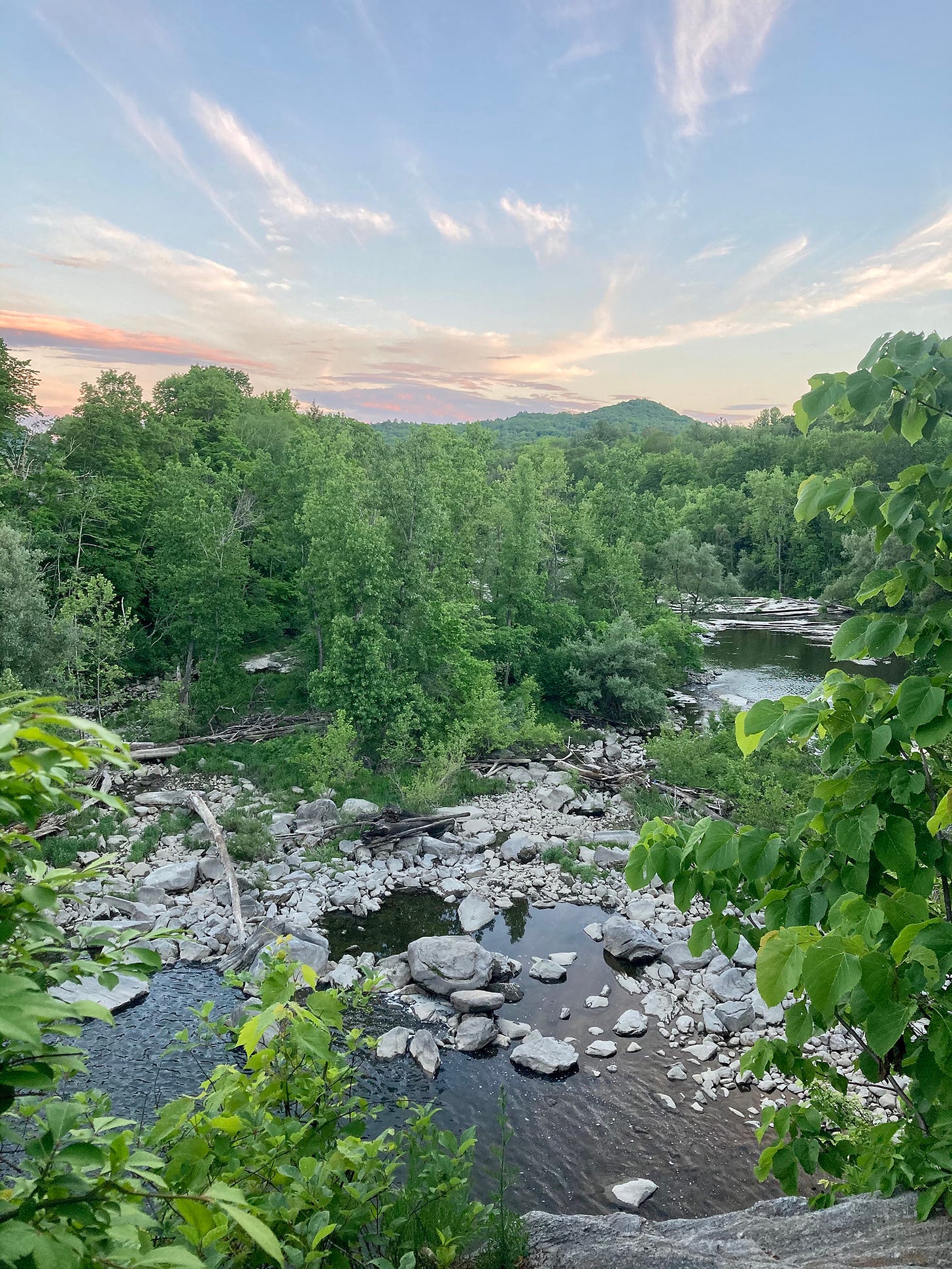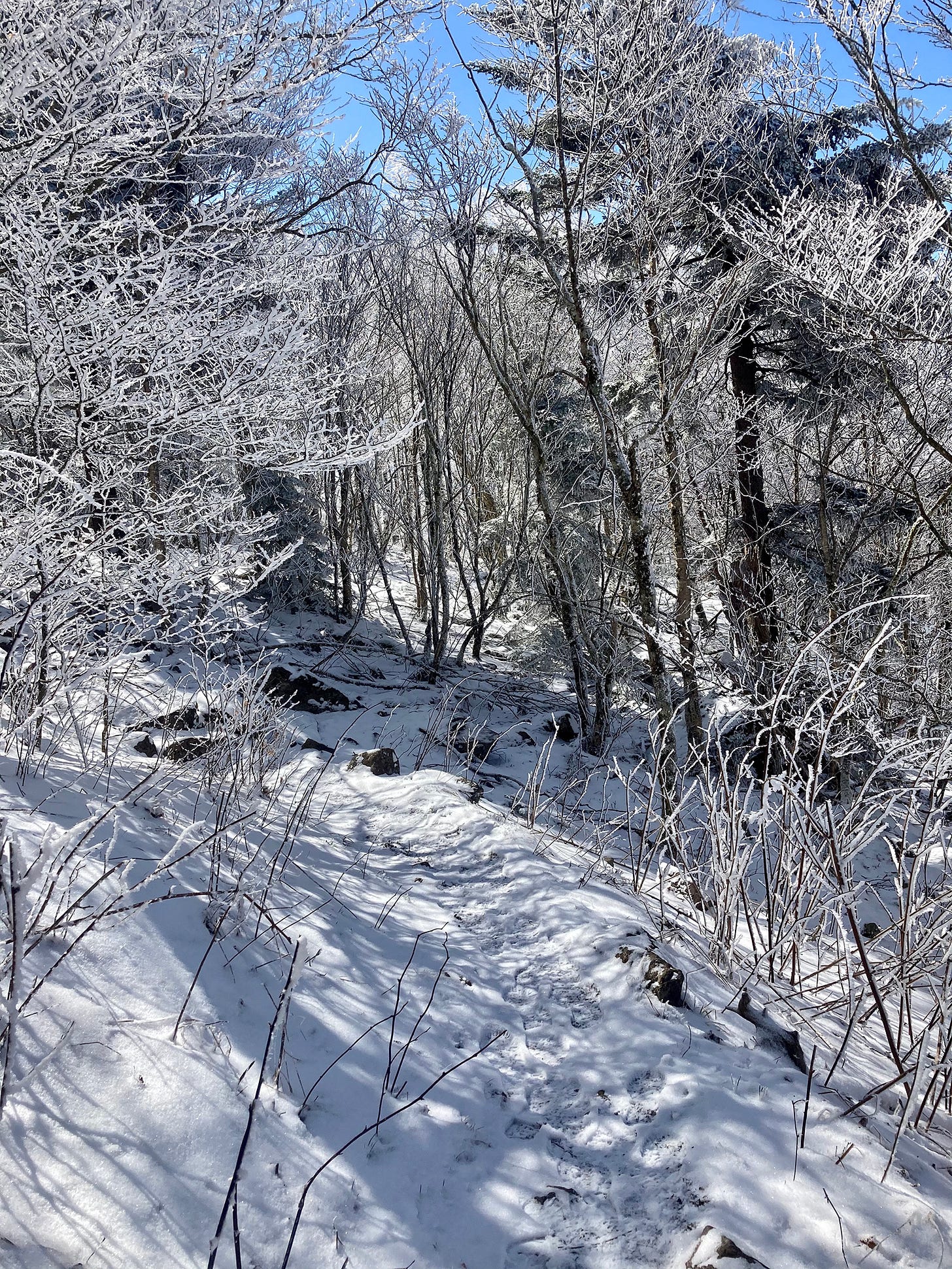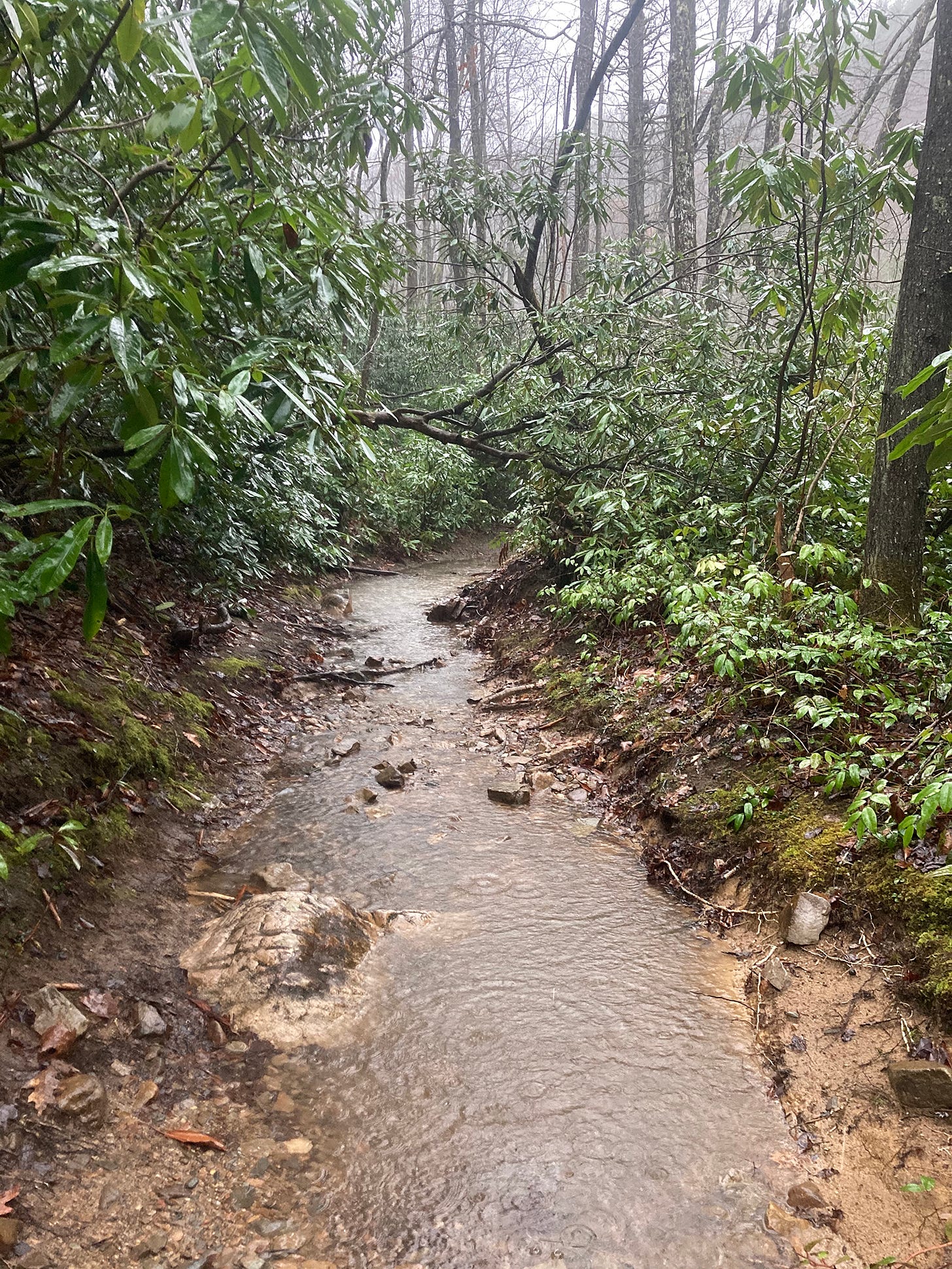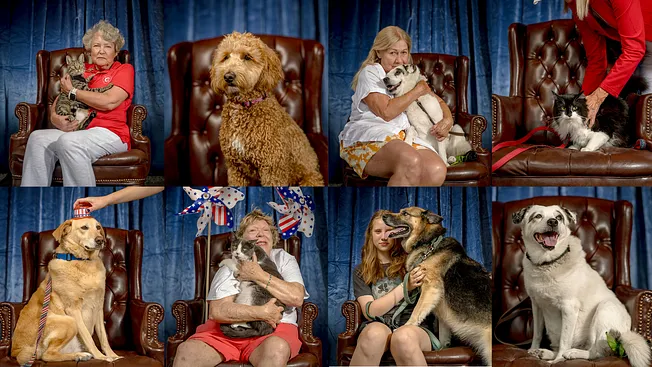When I was 18 years old, I decided to hike all 2,193 miles of the Appalachian Trail, from Georgia to Maine.
It was a strange year to come of age, 2020. Covid had canceled my high school graduation and delayed my freshman year of college; it was hard to see how to go out into the world and grow up. But from my bedroom in the suburbs of Chicago, there was an image I couldn’t get out of my head, a memory from a childhood trip in Vermont: little carved signs pointing out a path through the woods. Turn one way, and you could walk to Georgia. Turn around, and you could walk to Maine.
The Appalachian Trail’s length is about 9 percent of the Earth’s circumference and, in terms of elevation, equivalent to hiking up and down Mount Everest sixteen times. It was stitched together in the ’20s and ’30s for local recreation, not for long-distance backpacking: To hike its entirety, to be a “thru-hiker,” was originally thought impossible.
But in 1948, a WWII veteran named Earl Shaffer saw the newly-completed trail as a chance to “walk off the war.” After four long months, he stood atop Mount Katahdin in Maine, and an American tradition was born. Every year, thousands of hikers arrive at the trail’s southern terminus, on Springer Mountain in Georgia, hoping to follow in his footsteps. Only about 20 percent make it to the end; the rest get injured, sick, or give up.
I wanted to prove to myself I could do something most people couldn’t, and could do it all on my own. I’d never camped for more than a few days at a time, and never alone, but in February of 2021, I arrived at the foot of Springer, my eyes set on Maine. The journey would take five or six months. My pack—which held everything I would need to live on trail—felt heavier than it had in my living room.
I started slowly, my mileage light and the late-winter days still short. In my first week, freezing rain poured down; I had not yet mastered the art of setting up a tent in howling wind quickly enough to keep my sleeping bag dry, my numb fingers fumbling with stakes. One night, it dropped below freezing, and I woke up knowing I was at risk of hypothermia.
It was my first moment of real fear on trail; there was no one around to take care of me, no one else to correct my mistakes. I started doing sit-ups in my sleeping bag to generate body heat.
I learned to love the self-sufficiency of trail life. I made my own rules. I decided when to hike and when to rest. In every town, I’d look at a map and decide how much food to buy for the journey’s next leg. When I was cold at night, I’d light a fire; when I was bored, I’d sing James Taylor. As spring exploded around me, I harvested wild garlic mustard and bathed in deep streams. It was like living in a folktale.
I could feel myself getting stronger. Thru-hikers call it “getting trail legs.” Nine-mile days gave way to twelve, and twelve to sixteen; as the nights got warmer, I slowly made my way up the country—Georgia, North Carolina, Tennessee.
And I wasn’t always on my own. On another miserable, stormy day, I came across an unobtrusive paper bag tucked between the roots of a tree. Inside, I found homemade apple turnovers, delicately wrapped in parchment paper, which had kept out the worst of the rain. This was my first encounter with what thru-hikers call “trail magic,” little offerings left by locals to lift our spirits. We called them “trail angels.”
Trail magic came in all shapes and sizes: coolers full of drinks, rides into town when I needed to resupply. People I’d never met before welcomed me into their homes for a night’s sleep and a much-needed shower.
Friends back home were, of course, horrified by this: “What about serial killers?!” And I was wary at first, too. After all, my generation was raised on a steady diet of stranger-danger assemblies. But when you thru-hike the AT, you are constantly bombarded by the kindness of strangers, and it becomes easier and easier to accept.
The spring storms seemed endless. When the rainwater flowed downhill, the trail was like a shallow river. I’d hike ankle deep against the current; I’d climb over the downed trunks of storm-toppled trees. Virginia, West Virginia, Maryland.
One day in April, a hiker came bounding up to me in Shenandoah National Park, salt-and-pepper mane blowing in the breeze. Before I had even finished introducing myself, he was offering me the dingy little earbuds he hiked with: “They’re my favorite Brazilian punk band!”
Long-distance backpacking attracts an eclectic community, hippie-dippie potheads and gruff ex-Marines alike. I met Bowdoin graduates and welders’ sons; some hikers had the Pride flag stitched onto their packs, others sported the thin blue line. We all knew each other by our trail names, a break from who we’d been in the “real world”: There was Shivers and Shiner, Skeeter and Pixie, Goldie and Dolittle. My new friend was called Midnight.
It turned out he had grown up not far from me, but he left town before I was born, so we’d never have met in Illinois. As a young man, he’d renounced his family fortune and had been traveling the country ever since, a kind of itinerant music teacher; I never asked how old he was.
Midnight was unflaggingly positive, and always claimed to feel no pain. Of course, part of his strategy was a near-constant supply of weed—he hiked without trekking poles, so his hands were always free to pack a bowl.
In the “real world,” I never would have befriended Sundance, either. We first met at a hostel in North Carolina, but I kept running into him—at a lookout point here, at a campsite two weeks later. A 67-year-old former Green Beret’s wiry strength and grit put us all to shame: He was often up before dawn, not willing to let his age decrease his mileage. We made a funny pair sitting around the fire, telling stories—he was one of the oldest hikers on trail, I was one of the youngest.
Sundance didn’t much care for Midnight’s habits—“he smokes too much hash,” he’d say—but it was never an issue. When you’re hiking together, the outward trappings of difference don’t matter all that much. Everyone is interested in the same things: Where’s the nearest water source? How bad will that next climb be? Does it look like rain?

The storms of May gave way to 100-degree days in June, and with early summer came black bears, ticks, and rattlesnakes. Pennsylvania, New Jersey, New York.
One day in Pennsylvania, I sat on a mountain overlook under clear blue skies. Looking out on the land, I realized I was learning to love America by walking it. I thought back on childhood trips to Italy and France, where people prized the local and the familiar: the cathedral across the street, the twelfth-century tavern beside it. America is different, I thought—the land of the frontier, the land of the explorer. To love America is to love something wild and ever-changing; our greatness is measured in space rather than time.
Two-thirds of the way through my trek, I was hiking twenty, twenty five, even thirty-mile days, eating five thousand calories and struggling to maintain my weight. My body was starting to break down. On the descent from New York’s Bear Mountain, all I remember is the pain. It was a June weekend, so a steady stream of Manhattanites and young families were passing me on the trail. I noticed their concerned looks before I even realized I had tears streaming down my face.
The next day, an orthopedic surgeon in New York told me my leg could break if I continued hiking—I had shin splints that were developing into a stress fracture with every step. At that point, though, I was too far in to falter. Either my leg would break, or I’d make it to Maine. After a week of rest and against doctor’s orders, I was back on the trail.
I moved slowly through Connecticut and Massachusetts, living off of Tylenol and ibuprofen. The northernmost states are beautiful, but this was often lost on me. I thought about the refrain of The Little Engine That Could, huffing and puffing up the hill: I think I can, I think I can, I think I can. . .
Just up and over the next mountain. And the next. And the next. Vermont, New Hampshire, Maine.
For days before you reach it, you can see Mount Katahdin’s imposing shadow laid out across the horizon. I knew my family had traveled to Maine, and would be waiting for me, after the final climb.
There’s a reason our folk heroes are rugged mountain men who survive by their own strength and wit: It’s true that no one can get you up the mountain but yourself. But as I reached Katahdin’s summit, I thought about my family, and my friends on trail. I thought about the trail angels who had helped us. I thought about Earl Shaffer, and the generations of Americans who cut the trails we walk.
I started college only a few weeks after standing on that summit, and found many of my classmates were afraid of independence—of living alone and taking care of themselves. Without having been on trail, I might have been the same. In high school, after all, there had always been a drumbeat to march to, whether from parents, teachers, or coaches. But on trail, I’d had no one to follow but myself.
Like my friends, I often worry about what I can achieve, whether I’ll succeed on my own. But somewhere in the back of my mind, I can still hear that most-American of refrains, the one I thought of over and over again on the trail: I think I can, I think I can, I think I can. . .
Elias Wachtel is an intern at The Free Press. Read his piece “My Generation Needs to Do National Service.” To support our work, subscribe today:














our Comments
Use common sense here: disagree, debate, but don't be a .